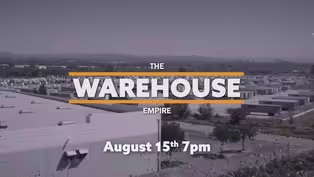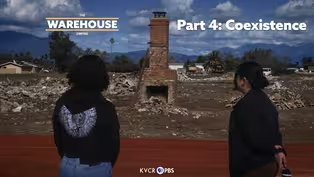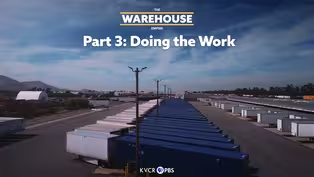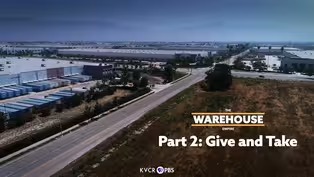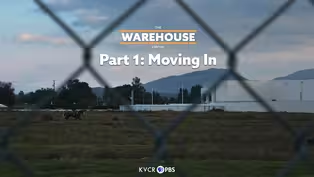The Warehouse Empire
Part 3: Doing the Work
Clip | 11m 30sVideo has Closed Captions
Warehouse workers are vital but face job quality challenges.
Employees are the backbone of the warehouse and logistics industry, yet they can also face challenges related to job quality. Hear from a former warehouse employee about their experience, and learn from the Warehouse Worker Resource Center, whose mission is to protect these workers.
Problems playing video? | Closed Captioning Feedback
Problems playing video? | Closed Captioning Feedback
The Warehouse Empire is a local public television program presented by KVCR
Support of the Empire Warehouse series on KVCR-TV comes from the Creative Corps Inland SoCal, a collaboration between the California Arts Council, the Inland Empire Community Foundation, Arts Connection, Riverside...
The Warehouse Empire
Part 3: Doing the Work
Clip | 11m 30sVideo has Closed Captions
Employees are the backbone of the warehouse and logistics industry, yet they can also face challenges related to job quality. Hear from a former warehouse employee about their experience, and learn from the Warehouse Worker Resource Center, whose mission is to protect these workers.
Problems playing video? | Closed Captioning Feedback
How to Watch The Warehouse Empire
The Warehouse Empire is available to stream on pbs.org and the free PBS App, available on iPhone, Apple TV, Android TV, Android smartphones, Amazon Fire TV, Amazon Fire Tablet, Roku, Samsung Smart TV, and Vizio.
- [Announcer] Support of the Empire Warehouse series on KVCR-TV comes from the Creative Corps Inland SoCal, a collaboration between the California Arts Council, the Inland Empire Community Foundation, Arts Connection, Riverside Arts Council, and the California Desert Arts Council, putting visual and media artists to work in the region.
And, viewers like you.
Thank you.
♪ - [Sofia] Honestly, nowadays, online shopping is too easy.
Wherever I go on my phone, it's everywhere.
Look.
I could be watching funny videos and in one swipe, I'm shopping.
But, one thing that does come to mind is all the work, facilities, and hands needed to make this...possible.
[upbeat music] ♪ - [Sofia] So, we've been focusing on the impact that the warehouse and logistics industry has on the communities around them.
However, I wanted to know how it is for the workers that work within them.
Growing up in San Bernardino, I have had countless friends and family who have at one point had a warehouse job.
Here in the I.E., we got plenty of them.
To get more insight on how it is for warehouse workers, I'm going to meet with my cousin Adam, who used to work at Amazon.
♪ - [Sofia] How did you even get started at Amazon?
Like, how did you find out about that?
- Amazon.
So, how I found out about it was a mutual friend.
She-?
At the time, I didn't have a job and she was, like, "Hey, like, there's an opening position over here in Amazon.
"They just built it brand new.
Would you want to apply here?"
And, I was like, "Sure.
What do I need to do?"
She basically was just like, "Just apply online, wait for a call, and then go in, get COVID tested."
At the time, being a full-time college student, I learned I wanted more experience in the real world.
The certain positions that I had, they just were mindless.
You felt like-?
Yeah, you did feel like a robot doing the same thing over and over, but I did work long hours.
So, I remember going in at 4:00 AM, four in the morning.
I would get off probably three?
Three in the afternoon.
So, there were definitely long hours.
During the summer, it does suck because if you do work in the trailers, whether it's called inbound or outbound, you are gonna be in there for quite a while.
So, that's the part where you need to-- You need to stay hydrated as much as you can.
If you feel like you're gonna pass out, let them know.
Let them know that, "Hey!
Like, I'm a little bit lightheaded."
I've seen a couple people pass out.
- And, in the trailers?
- And, it's enclosed.
You can smell everything.
They did have fans.
It didn't-- Sometimes it worked, sometimes it didn't.
- [Sofia] Yeah.
- [Adam] But, I mean-?
- So, you would go in there and hope.
- You just hope it's- - Like, the fan's working.
- [Adam] Yeah, just in case.
But, yeah.
It did get hot in those.
- [Sofia] Would you do that as, like, a career?
Or, no?
- As a career?
No, I wouldn't.
- No?
- Now knowing what I had to do, I probably wouldn't.
But, desperate times?
Desperate situations.
If you gotta do it, you gotta do it.
- Yeah.
- For me, I learned, you know, when you're a man, you need to take care of your family, and that's something I grew up with.
- Yeah.
- Traditionally, it's how I was raised and I went to work and I was like, "You know what?
I need to help my brother.
I need to help my mom."
- Yeah.
- I was willing to take that load on.
When you go to work at Amazon, you just need money.
You just need to-?
I mean, if you need a steady job, it's a good steady job just going for the money.
But then, there's some people that they actually take it a step further.
Props to them; they're looking more into it.
They look into environmental causes that Amazon might do.
Me, personally, I wasn't that kind of person.
I just went in, went to work, leave.
- [Sofia] I can get that.
Like, it could help maybe, like, educate people?
Because, sometimes you don't know like what you're exposed to.
- Yeah.
That's-?
- Yeah.
'Cause you know you're working and you're, like, what if I'm touching, or like-?
- [Adam] The wrong stuff-?
- Where I'm at, it was like, there's something there.
- Especially in Amazon.
Like, I remember when I was in a trailer, we'll pull boxes out and there's, like, liquid stuff that we never seen before!
- Yeah!
- And we're like, "Oh, what is this?"
Some people said, "Oh, it's just soap.
Some people said it's, like, "Oh, it's a car battery", or something like that.
- Yeah.
Like, a mystery box.
- It's a mystery box; you don't know what you're getting!
- Gee!
- But, no.
There's times-?
I mean, of course, we wear gloves.
But, I mean, if it's leaking, our gloves are not-?
- Yeah.
- They're not the safest ones.
They're just making sure that we don't get blisters.
But, if that chemical gets within our hands, we might have something on us.
So, it's always best to be careful on what you have.
- But, I can understand that.
It's, like, you're working and sometimes, like, you know?
The environment, or certain issues?
They're not really talked about, especially.
You know?
- Yeah, some people didn't know about it.
We didn't-- I didn't know about it until I left.
I see the news going on about Amazon, the trucks going on.
I just-?
I just went in, worked, get out!
(laughs) - Yeah, you're barely awake!
- Barely awake.
Yeah!
- You're barely awake.
- 4:00 AM, man.
- I get it.
- I just wanna get out.
- Yeah.
So, props to you, though.
'Cause that was not easy.
I remember seeing you.
You had, like, a beard.
- Yeah.
- A Monster can!
- I would drink two a day!
Just go in; get it done.
Robot.
- You're like running on E, basically.
- Yeah, definitely running on E!
(he laughs) - You did it, though.
- Did it.
[gentle music] ♪ ♪ - [Sofia] After that conversation with Adam, it really reminded me of the Latino work ethic of, "tell me what you need done and it'll get done."
I think many workers, [click!]
especially people of color, which make up the [click!]
majority of I.E.
warehouse workers, are primarily [click!]
focused on paying for rent and putting food on the table.
[click!]
For many of them, information on the environmental [click!]
and health hazards of the industry is [click!]
inaccessible or often not presented in an easily comprehensible way.
To get more of a full picture of what many warehouse workers deal with, I am talking with the executive director of the Warehouse Worker Resource Center.
- [Sofia] Have you noticed any common health or safety concerns that warehouse workers are dealing with?
- There's a few kind of main areas of injury, and health and safety issues that we see consistently.
This is a, you know, massive industry with a very diverse set of facilities.
But, maybe the categories fall into kind of musculoskeletal injuries, some of which are coming from repetitive injuries, repetitive motion injuries, for workers who are just doing the same thing all day, moving a box or doing more small work like, consistently, but at a really high pace.
More catastrophic injuries, like getting hit by a machine or a forklift, or something like that.
Or, something like a box falling on you is another really common area.
Just, you know, something that you know exactly what happened and it was a big impact.
And often, those are the injuries that you're likelier to get time off for workers' comp because it's pretty clear what happened.
But often, that does lead to just injuries that keep coming back.
A lot of those workers even though they have the right to workers' comp and treatment, don't necessarily get it as much as they need.
And, most of these folks also don't have health insurance through their employer.
So, it's really hard.
Then beyond that, you start to see, you know, kind of illnesses and injuries related to heat, which is really, really increasing.
As climate change is increasing, as we start to see more and more workers who are working, not just indoors inside a warehouse that might heat up, but also going out into a container, going out onto a yard and being out in the sun in really hot times in the summer.
And, those are similarly, like, really hard to track because somebody might have a heart attack, somebody might faint; is that because of the heat?
Probably somewhat, but it's hard to track.
And so, employers are really good at saying, "Oh, that person just had a bad heart."
We worked to establish a indoor heat standard in California.
So, we've worked to establish policies that establish what we call joint employment.
Basically, if you're at a warehouse operated by Walmart, but you're employed through the third party, employed through a staffing agency, both companies are actually responsible for your working conditions.
[gentle music] ♪ ♪ - [Sheheryar] So, taking action in the workplace is a risk.
And, the first thing we tell people is to make sure that they don't do something that they're gonna regret.
We educate people about their rights.
We educate people also about best practices, about how to take action and have the best chance of success, both to get what they're calling for, but also to protect themselves from termination.
And, we also tell people that it's a risk and we also let people know, right?
Like, that's the decision that they have to make.
What we remind them is that, again, like, one person on their own?
The risks are pretty high.
Ten people, a lot better; a hundred people, right?
Much, much, much better.
Not just because you're one of a larger group, but because of the power that group creates.
[bright upbeat music] ♪ ♪ - [Sofia] So, warehouses?
They're not going away anytime soon.
But, I do think by educating workers on the injuries and hazards that they can experience on the job is a good step.
So, I really admire what Warehouse Worker Resource Center is doing, because these people are honest workers.
Whether you're a delivery driver loading up cargo or packaging, you deserve to work in a safe condition.
[upbeat music] ♪ ♪ [upbeat music] ♪ [music fades] - [Announcer] Support of the Empire Warehouse series on KVCR-TV comes from the Creative Corps Inland SoCal, a collaboration between the California Arts Council, the Inland Empire Community Foundation, Arts Connection, Riverside Arts Council, and the California Desert Arts Council, putting visual and media artists to work in the region.
And, viewers like you.
Thank you.
Preview | 30s | Sofia Figueroa investigates the growth of the warehouse and logistics sector in the Inland Empire. (30s)
Video has Closed Captions
Clip | 18m 10s | The warehouse and logistics industry will continue to shape the Inland Empire. (18m 10s)
Video has Closed Captions
Clip | 11m 30s | Warehouse workers are vital but face job quality challenges. (11m 30s)
Video has Closed Captions
Clip | 13m 18s | The warehouse and logistics sector offers jobs but also comes at a cost. (13m 18s)
Video has Closed Captions
Clip | 13m 24s | Discover why the Inland Empire is ideal for warehousing and how it impacts local residents. (13m 24s)
Providing Support for PBS.org
Learn Moreabout PBS online sponsorship
- News and Public Affairs

Top journalists deliver compelling original analysis of the hour's headlines.

- News and Public Affairs

FRONTLINE is investigative journalism that questions, explains and changes our world.












Support for PBS provided by:
The Warehouse Empire is a local public television program presented by KVCR
Support of the Empire Warehouse series on KVCR-TV comes from the Creative Corps Inland SoCal, a collaboration between the California Arts Council, the Inland Empire Community Foundation, Arts Connection, Riverside...
